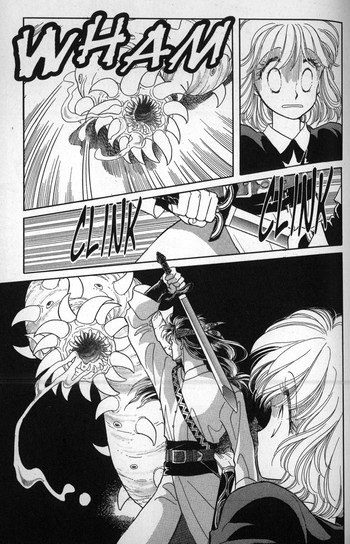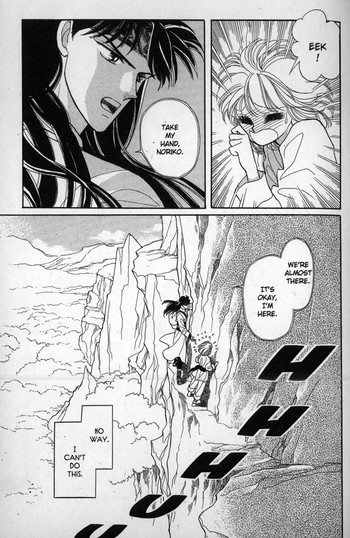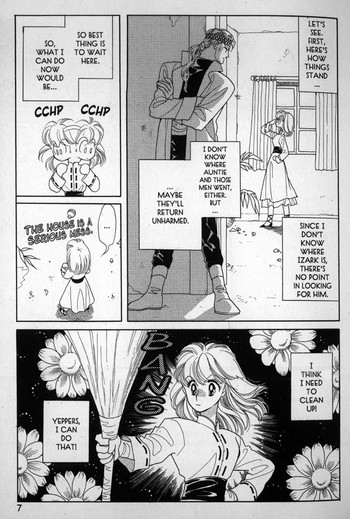House of 1000 Manga
From Far Away
by Jason Thompson,

From Far Away

It's the title that caught me: "Kanata Kara," From Far Away. It's simple, but it summons up imagery of fantasy worlds and distant deserts, deep green forests and strange cultures. Like the Kyoko Hikawa manga it describes, it's evocative, but it's also simple and direct. Just don't get it confused with "From a Distance."
It's that archetypal shojo story of a modern-day girl transported to another world, but it also looks faraway in another way, i.e., it looks real '90s. From Far Away ran from 1991 to 2002 in the shojo magazine LaLa, and was popular enough to be made into a set of drama CDs (the "not quite popular enough to be an anime" consolation prize). Viz probably chose it for translation because it was a favorite of Patti Duffield, who wrote a column on untranslated manga in Viz's magazine Animerica Extra. The English rewrite was even written by famous comic artist/comic historian Trina Robbins. Lots of old fan-favorite '80s and '90s manga got translated in the early days of the manga boom, but it didn't generally sell well; I remember an editorial meeting in the mid-2000s where Bill Flanagan, a friend of Duffield's, bummed out all of us old fans by saying we probably shouldn't license any pre-2000s manga anymore because new it was just too old.
Noriko is the teenage daughter of a sci-fi author. One day like any other day, she's caught in an explosion, and without further explanation she's blasted into another world, where she awakens on golden moss among the roots of a giant tree. The tree is infested with giant man-eating worms, but fortunately, she's saved by Izark, a bishonen, long-haired swordsman. He picks her up, puts her on one shoulder, and races off with her, slashing to keep the worms at bay. But they're not just pursued by worm-monsters: they're also chased by men on flying dinosaurs, and creepy warriors who teleport using little furry symbiotes called chimos to move at the speed of thought.
It turns out that lots of people are looking for Noriko: a prophecy says she is "the Awakening," the mysterious force that will awaken the Sky Demon, a terrifying apocalyptic monster. All the warring kingdoms want Noriko's power, including Rienka, ruled by the Machiavellian Lord Rechef, and Guzena, a kingdom ruled from the shadows by the mysterious Lord Mokumen, "Silent Mask." Noriko herself is just confused and doesn't know about any of this, particularly because she doesn't speak the language at first. It's an interesting realistic touch (albeit an arbitrary one since the rest of the story is completely unrealistic), although Hikawa cheats a little by not entirely telling the story from Noriko's perspective: it switches back and forth, with Izark saying "I can't understand a word you're saying" in one panel, and then in the next panel it's Noriko who can't understand Izark, and so on. A comic told entirely from the perspective of someone who couldn't speak the language, like Chester Brown's Underwater, might have been more interesting, but it would have been a challenging read. Anyway, over the first few volumes Noriko gradually picks up the language, like an otaku struggling to learn Japanese by listening to conversations in anime. Every now and then she screws up and says something totally wrong, like when she keeps calling Izark "honey" and embarrassing him, but eventually she becomes familiar with this strange world.

And strange it is. It isn't until volumes 10-11 that Hikawa shows us a world map and names all the countries, but the unnamed world of From Far Away is a weird place. There are giant insects, enchanted forests, a villain with five mouths, spirits, mutants, a water demon, a hair demon, giant hands that come out of the sky. There's forces of Light and Darkness too, and Darkness is on the rise. ("Cruelty is an everyday occurrence here," Izark tells her. "You mustn't take it too seriously, or you'll have a nervous breakdown.") Izark and Noriko end up on the run from the evil authorities, together with a ragtag band of heroes: Gaya, a middle-aged swordswoman who reminded me of Chiyoko from Akira; Geena Haas, a blind child prophet; Banadam, a bandit who falls in love with Noriko; and Barago, a strongman who shows up as a random mook but has a change of heart and becomes a hero. The strongest of all, however, is Izark. His strength and agility seem more than mortal, he can leap 20 feet in the air and regenerate from wounds in a few hours…and he has other powers within him, demonic powers that he can barely control. Only Izark's feelings for Noriko can keep his dark side in check, the side that is part of his darkest secret…he went looking for "the Awakening" to kill it, before he realized that the so-called "Awakening" was an innocent girl. Because Izark is none other than the Sky Demon, who wants nothing more than to remain human, and to stop the prophecy that says he will turn into a monster and destroy the world…
You might like From Far Away if you like Chie Shinohara's Red River,which has a similar oldschool art style, adventure in exotic lands, and a fairly passive heroine who spends a lot of time getting rescued. Apart from that, however, they're very different: Red River is full of romance and sex and flimsy silk robes, but From Far Away has modest Slavic-influenced clothing and avoids sexy stuff (there's just a few kisses) in favor of ACTION!!! Early in the series, Izark meets his rival, Keimos, a chi-powered martial arts maniac who becomes obsessed with defeating him ("I'm going to be stronger than anyone else! Killing is my life!"). Their fireball-shooting fights read exactly like something from Dragon Ball, and give the series a strong shonen manga flavor. Izark basically even goes Super Saiyan at one point. I wondered if this was a conscious attempt to make the series appeal to both genders, but elsewhere Hikawa says that her readership is 99% female, so it must have been her personal preference ("I like Jackie Chan movies," she confesses elsewhere).

The action is good, there's lots of interesting landscapes and creatures and glimpses of exotic lands, but From Far Away does have flaws. At several points, between volumes 2-3 and again at 5-6, the plot jumps forward awkwardly; at one point Izark and Noriko are traveling with friends, then the friends vanish; romantic subplots start and then stop abruptly; at another point there's a confession of love that sort of comes out of nowhere. Perhaps it's stop-and-start because Kyoko Hikawa took several long hiatuses due to health problems; the 14 volumes took 11 years to come out. Hikawa also uses too much narration; Noriko frequently explains what's happening instead of just showing us. ("The horror in front of us was shocking…all we could do was watch…") Between these various problems, the story doesn't have the flow of the best manga. (It's only in manga that a story can take 2600 pages and still feel like there wasn't enough time to flesh out the characters.) And of course, there's the fact that Noriko spends more time being a damsel-in-distress than actually doing anything…but at least learning a foreign language is an accomplishment, right?
If the heroine's big watery eyes and floofy oldschool anime hair turn you off, give From Far Away a second look; the art's actually quite good. Hikawa drew it the old-fashioned way, almost entirely by herself, only bringing in an assistant one or two days out of the month, so of course it can't compete with the screentone overload that you get in many modern manga drawn by a team of five or six people. (And since this was the '90s, before Photoshop got good, Hikawa had to apply all her screentone by hand.) Unfortunately, the aforementioned story problems make it more of a B-grade manga, a fun read, but not quite as epic as it could be. It must have been fascinating to a non-native speaker seeing it on the bookshelves of Kinokuniya in the '90s, starting by translating the title: From Far Away. It's a great title. It's a pretty good manga.
discuss this in the forum (23 posts) |